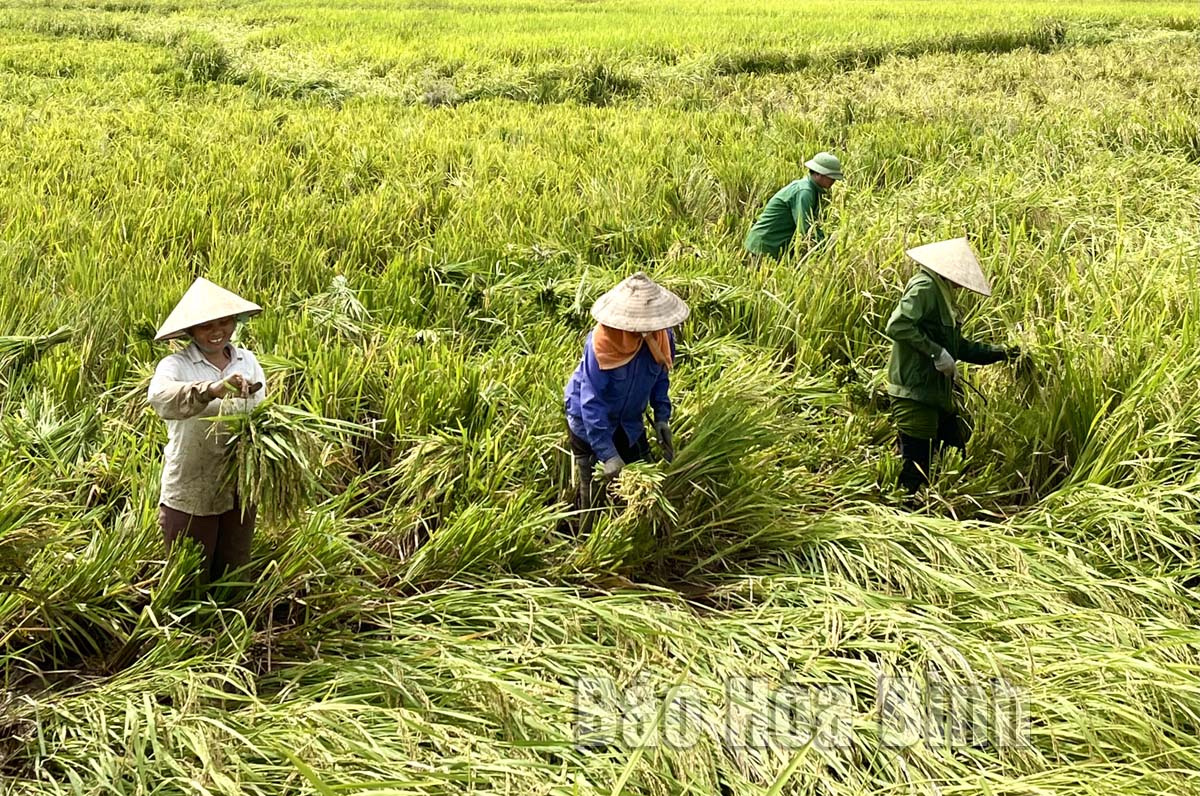
(HBO) - Thanks to the direction of the provincial authority and agricultural department, farmers in Hoa Binh have overcome challenges caused by the COVID-19 pandemic as well as plant and animal diseases to successfully complete the production plan for 2022 winter-spring crop.

Farmers in Kim Boi district’s Dong Bac commune harvest winter-spring rice.
Bui Thi Luong, a resident at Go Khanh hamlet, Kim Boi commune said they have
bumper crop this year. She attributed it to the proper care and the compliance
with the seasonal schedule and disease control under the guidance of local
agricultural officials.
Not only farmers in Kim Boi district but those in other localities in the
province also rejoiced because they got high yield in this crop. The average
yield is at 5.88 tonnes per hectare and total rice output of the province is
estimated at 97,000 tonnes, reaching 104.4 percent of the plan. Other crops
such as peanuts, cassava and vegetables all obtained high productivity and met
or exceeded the target.
According to the provincial Department of Agriculture and Rural Development,
favourable weather condition, the adoption of drastic measures in directing
production and proactiveness in restructuring of the agricultural sector at
localities have contributed to a successful winter-spring crop.
The department said the province strives to plant food crops on 44,300 hectares
for the summer-autumn crop, of which grain plants will cover 33,100 hectares.
Rice yield is expected to reach 5.3 tonnes per hectare while that of maize will
hit 4.4 tonnes per hectare.
In order to achieve good crops, the department asked localities
to promptly harvest winter-spring rice and other crops so as to early roll out
production plans for the summer-autumn crop, creating favourable conditions for
winter crop production.The cultivation area for crops with high economic
value should be expanded along with strengthening trade promotion activities
and sale of agricultural products, focusing on key products with export
advantages.
Favourable condition should be created for enterprises who invest in
agricultural production development in the province, the department said,
adding that localities should have specific plans to be ready to protect crops
given the complicated and unpredictable natural disasters./.
The Standing Board of the Hoa Binh provincial Party Committee has agreed in principle on a proposal by the Standing Board of the Party Committee of Hoa Binh city to gather feedback on the city’s 1:2000 zoning plan, which forms part of its broader urban development strategy.
Hoa Binh province has made notable progress in public administration reform and digital government development, with the satisfaction index among citizens and businesses reaching over 84%, according to recent government evaluations.
Thanks to great efforts by local authorities in recent times, the governance and public administration performance of Mai Chau district has been significantly improved.
In the afternoon of June 6, the Party Committee, the People's Council, the People's Committee and the Fatherland Front of Lac Son district solemnly held a meeting to celebrate the 139th anniversary of the district's founding (1886–2025) and the 79th anniversary of the establishment of the district's Party Committee (1946–2025). There was the attendance of Mr. Bui Van Thang, the Vice Chairman of the Provincial People's Council; Mr. Quach Tat Liem, the Vice Chairman of the Provincial People's Committee; Ms. Dang Bich Ngoc, the Deputy Head of the National Assembly Delegation of the province; as well as the former leaders of the province and district through various periods, who are the natives of the district.
Implementing the Politburo’s Resolution No. 57-NQ/TW on breakthroughs in science – technology, innovation, and digital transformation is a golden opportunity for the northern mountainous province of Hoa Binh to renew growth model, improve competitive edge and shorten digital gap.
Resolution 57-NQ/TW, issued by the Politburo on December 22, 2024, identifies sci-tech, innovation, and digital transformation as strategic breakthroughs to build a developed and prosperous nation. In Hoa Binh province, this spirit is not just a slogan, it’s being put into action through concrete initiatives that form a "new development triangle”: digital citizenship, digital economy, and digital administration.



